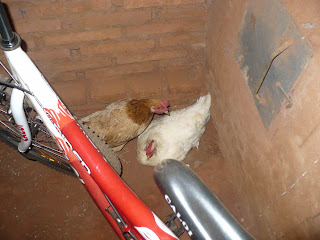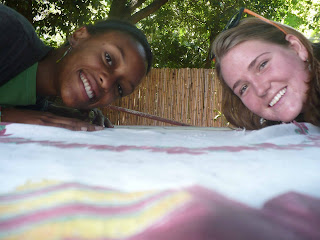And then, a few months ago, chickens became much more.
Almost every family in my community already has chickens. They are all over. They eat everything they can find, wander to far-off places, and when they decide to lay eggs, they do so wherever they see fit before climbing high into a mango tree to sleep for the night. But in July the agricultural committee randomly received 10 well-bred chicken babies sponsored by the mayor. I’m still unsure when the inspiration hit. It may have been the moment I saw those boxes of fluffy chicks being passed out to the agriculture committee. Or maybe when people started talking about how the chicks were dying. But I think it finally hit when one lady, chicken-less after only 4 weeks, recognized out-loud that she had no idea how to raise those chickens or why they died.
The committee had been hankering for a project, and after these chicken stories I couldn’t escape the opportunity glaring me in my face. I would teach my women how to care for their chickens. But they needed a reason. Other talks with them had established that beyond the winter-garden season where they could sell vegetables, they often lacked a steady income. Recent trips to the local store demonstrated that the local economy also lacked eggs. And so, it was born: the chicken project.
After watching to many easy projects fail in arriving, in their implementation, or in sustainability, I worked with all my resources to protect my project from a sad and unfortunate fate. Rules were born:
1) To be involved in the project, each woman had to be a long-standing and participatory member of the women’s committee.
2) Each person must attend a series of 4 talks about chickens in order to receive the project.
3) Each woman must contribute an equal percentage of crops from their fields towards the production of home-made chicken feed.
4) Each woman must work equally to raise the money for the community contribution.
5) Each woman must plant at least 5 lines of pigeon peas, a green manure, in their fields to go towards future chicken feed.
6) Each woman must have their chicken house built within a month of the materials arriving.
7) Each woman must keep at all times at least 6 chickens in her chicken coop.
At first things were hard. Despite constant reminders, good friends in the community tested my rules by skipping the first talk. When I had to kick them out of the project committee, I worried that everything would go downhill. I lost faith.

Slowly, faith returned. The 24 women that came to the first talk, came to the last 3 as well. When chicken-feed ingredients were requested, they took their time to make feasible promises that equaled what we needed. Women have already shown up at my house with contributions towards the chicken feed that may be months away in the making. And at every house I visit, something clicks in the minds of the women about mid-way through the visit, and they jump up excitedly to go show me their pigeon pea seedlings and show me where their chicken house will be built.
As of now we are waiting for the money. The application for a SPA grant through Peace Corps is in, thanks to great help from the president of the women’s committee, and hard days of cooking and selling chicken and empanadas has us only a few dollars away from our community contribution goal. And now we wait.
And now, though the chickens that get into my garden still piss me off, I see in them an opportunity. The ‘chicken chatter’ around town is positive, women are even putting some of the practices learned in talks to use with the chickens they have. The room underneath my guest bed is almost full of corn, beans, and coco waiting to be ground for future feed.
They did it. They followed the rules, and have astounded me with their progress. As I work to ensure that my part in the project pulls through as well, I notice that the women walk into meetings a little taller and laugh a little louder. Those garden destroying chickens have already begun to empower a capably group of people looking for a chance to prove themselves. And prove themselves they will continue to do, I tell them. Because though we may have to wait, when those chickens finally get here, are well fed and well kept, and start producing lots of eggs, I will be over at each of their houses to try one.
First came the chickens, then the eye-opening empowerment of the women, and now comes my time to learn patience in the funding process. We finally got confirmation of funding! But red-tape keeps its from materializing too soon. The day will come though, I hope, when its all about the eggs, and six months after, a few plates of home-made chicken soup as we watch baby chicks chirp away the beginning of the cycle.

















































